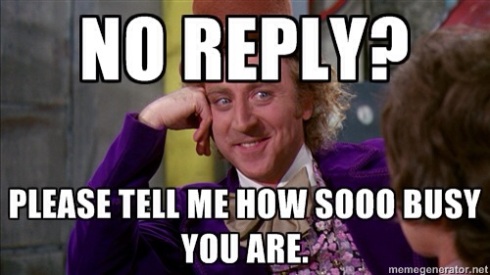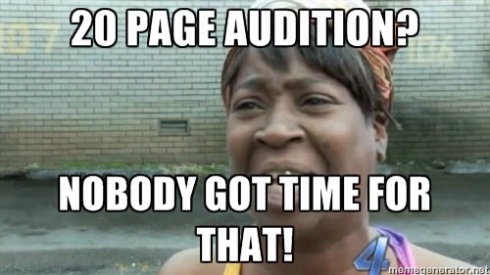About two years ago, I wrote a very well received blog post called 7 Reasons Why Your Book is not Getting Auditions on ACX. As time has gone on and the ACX platform has matured, authors have still given us narrators plenty of reasons to run away from the titles. Here are just a few of the ways you can make sure that your audiobook never gets produced.
1) Don’t respond to questions.
 If I ask you a simple question like, “are you still accepting auditions?” because your book has been stagnating on ACX for 6 months and you don’t reply? Guess what? I’m not auditioning.
If I ask you a simple question like, “are you still accepting auditions?” because your book has been stagnating on ACX for 6 months and you don’t reply? Guess what? I’m not auditioning.
2) Ask for multiple narrators on a royalty share gig.
Seriously. Royalty share gigs have a hard enough time earning back the time and energy put into creating them. Why would I want to split those royalties with another narrator and only get 10%? If you want more than one narrator, pony up the cash and pay for it.
3) Expect music and sound effects.
First of all, no audiobooks do this. At least not very many. Those that do are full cast audio dramas and are very expensive to produce. As a result, they are expected to sell really well. That’s why you’ll see timeless pieces of literature such as Dune and Ender’s Game getting that treatment. Sorry, your debut novel is not Dune or Ender’s Game.
4) Ask for an audition longer than 10 minutes.
 You know in the first 30 seconds if I’m the guy for your book. So please don’t act like you need to study my audition for 20 minutes to make sure I get the right intonation or capture the essence of your vision. Instead pick a 1-2 page part of your book that has the central characters’ dialog and post that. You’ll know if I’m right for it.
You know in the first 30 seconds if I’m the guy for your book. So please don’t act like you need to study my audition for 20 minutes to make sure I get the right intonation or capture the essence of your vision. Instead pick a 1-2 page part of your book that has the central characters’ dialog and post that. You’ll know if I’m right for it.
5) Say you’re offering a per finished hour rate OR royalty share.
 Do you not know what you’re offering? Or are you offering us a choice? Because if you’re offering us a choice, we’re going to go with a decent per finished hour rate. Every. Single. Time. Instead, what this feels like to us, is bait and switch. Enticing us to audition with a pfh rate and then sneakily making us a royalty share offer. That may not be your intention, but that’s what it looks like to us.
Do you not know what you’re offering? Or are you offering us a choice? Because if you’re offering us a choice, we’re going to go with a decent per finished hour rate. Every. Single. Time. Instead, what this feels like to us, is bait and switch. Enticing us to audition with a pfh rate and then sneakily making us a royalty share offer. That may not be your intention, but that’s what it looks like to us.
6) Offering a title in the sub $100 buckets.
 Anything in the sub $100 pfh bucket is a joke. You expect us to work at barely minimum wage just so you can get all the royalties? The only narrators you’re going to get are those who have no idea what they’re doing. And the end result will show that. Great way to display the book you slaved away on for a year. Either pony up a reasonable amount of money, or go the royalty share route.
Anything in the sub $100 pfh bucket is a joke. You expect us to work at barely minimum wage just so you can get all the royalties? The only narrators you’re going to get are those who have no idea what they’re doing. And the end result will show that. Great way to display the book you slaved away on for a year. Either pony up a reasonable amount of money, or go the royalty share route.
7) “Auditions will be posted to my blog for my fans to vote on.”
 What is this, Thunderdome? When I auditioned for you, I auditioned for you privately, not for you to hang me out to dry for the uneducated masses to vote on. And no, making it anonymous doesn’t make it ok. As much as I appreciate you wanting to create interest in the audiobook, this is not the way. Consider this: what if everyone hates all the auditions? Then your little attempt at promoting the book has just backfired. Not to mention doing so without permission is a violation of my copyright (yes, the text of the book is your copyright, but the performance is mine.)
What is this, Thunderdome? When I auditioned for you, I auditioned for you privately, not for you to hang me out to dry for the uneducated masses to vote on. And no, making it anonymous doesn’t make it ok. As much as I appreciate you wanting to create interest in the audiobook, this is not the way. Consider this: what if everyone hates all the auditions? Then your little attempt at promoting the book has just backfired. Not to mention doing so without permission is a violation of my copyright (yes, the text of the book is your copyright, but the performance is mine.)
8) Your audition script or synopsis is riddled with errors.
Please edit your book before you submit it as an audiobook. No, scratch that. Please have an EDITOR edit your book before you submit it as an audiobook. Nothing raises a red flag to narrators more than audition copy that is filled with typos and grammatical errors.
9) Expecting more than a couple flawless accents.
I think it’s great that your character is a jet-setting world traveler fighting crime across the globe. But not every single character needs to be performed with a flawless regional accent. By this logic, a narrator should be able to perform any regional accent from anywhere in the world. If you have incidental characters, there are ways to perform them without using authentic accents. Ask your narrator for one or two accents and let them handle the rest with their best judgement.
10) You’re offering royalty share for an ebook that is free.
I get that offering the first title of your series for free is a good way to get people hooked so they buy more in the series. But unless you and I have a contractual agreement that says you’re going to hire me for the rest in the series, you are simply undermining the sales I need to make up for the time and money invested. If you want to make your book permafree and have the audiobook produced, then pony up a reasonable pfh rate and skip the royalty share.
So there we have it. A meme-infused list of things you can do to assure that no one ever auditions for your audiobook. If that’s your goal, then huzzah! You’re almost there. If your goal is NOT to turn off every narrator on ACX, then you’ve been given a list of things to avoid doing.
Because after all…
Many thanks to Wayne Farrell, Andi Arndt, Kitty Hendrix, M.C Garnett, Jay Wohlert, Chris Barnes, Neil Hellegers, Corey M. Snow, Julie Hoverson, Nate Daniels, Fiona Thraille, Mike Dennis, Leah Fredrick, Rosemary Benson, Josh Carpenter, Paul Woodson, David. Gilmore, Ann Richardson, David Stifel, Kevin Minatrea, Karen Commins, and Carol Schneider for all the ideas and feedback.





 This one is for indie authors trying to get their books made into audiobooks on ACX via Royalty-share, unlike my previous
This one is for indie authors trying to get their books made into audiobooks on ACX via Royalty-share, unlike my previous